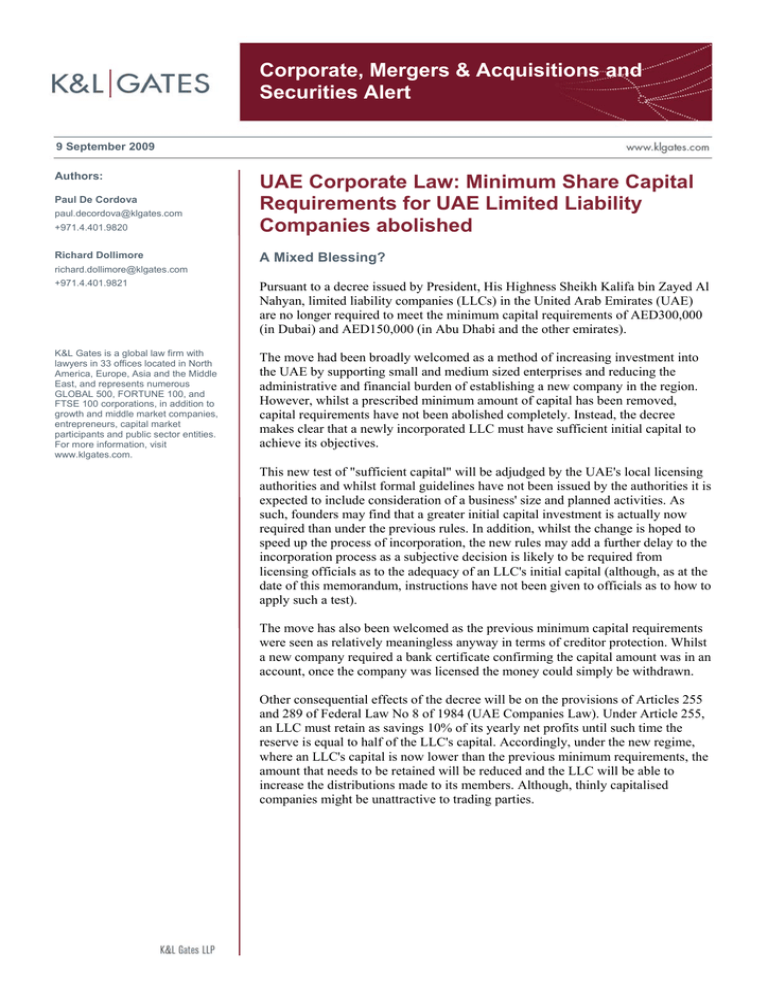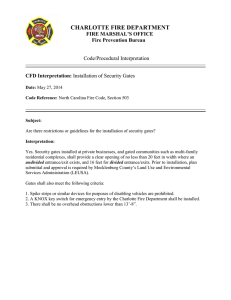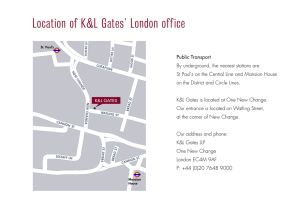
Corporate, Mergers & Acquisitions and
Securities Alert
9 September 2009
Authors:
+971.4.401.9820
UAE Corporate Law: Minimum Share Capital
Requirements for UAE Limited Liability
Companies abolished
Richard Dollimore
A Mixed Blessing?
Paul De Cordova
paul.decordova@klgates.com
richard.dollimore@klgates.com
+971.4.401.9821
Pursuant to a decree issued by President, His Highness Sheikh Kalifa bin Zayed Al
Nahyan, limited liability companies (LLCs) in the United Arab Emirates (UAE)
are no longer required to meet the minimum capital requirements of AED300,000
(in Dubai) and AED150,000 (in Abu Dhabi and the other emirates).
K&L Gates is a global law firm with
lawyers in 33 offices located in North
America, Europe, Asia and the Middle
East, and represents numerous
GLOBAL 500, FORTUNE 100, and
FTSE 100 corporations, in addition to
growth and middle market companies,
entrepreneurs, capital market
participants and public sector entities.
For more information, visit
www.klgates.com.
The move had been broadly welcomed as a method of increasing investment into
the UAE by supporting small and medium sized enterprises and reducing the
administrative and financial burden of establishing a new company in the region.
However, whilst a prescribed minimum amount of capital has been removed,
capital requirements have not been abolished completely. Instead, the decree
makes clear that a newly incorporated LLC must have sufficient initial capital to
achieve its objectives.
This new test of "sufficient capital" will be adjudged by the UAE's local licensing
authorities and whilst formal guidelines have not been issued by the authorities it is
expected to include consideration of a business' size and planned activities. As
such, founders may find that a greater initial capital investment is actually now
required than under the previous rules. In addition, whilst the change is hoped to
speed up the process of incorporation, the new rules may add a further delay to the
incorporation process as a subjective decision is likely to be required from
licensing officials as to the adequacy of an LLC's initial capital (although, as at the
date of this memorandum, instructions have not been given to officials as to how to
apply such a test).
The move has also been welcomed as the previous minimum capital requirements
were seen as relatively meaningless anyway in terms of creditor protection. Whilst
a new company required a bank certificate confirming the capital amount was in an
account, once the company was licensed the money could simply be withdrawn.
Other consequential effects of the decree will be on the provisions of Articles 255
and 289 of Federal Law No 8 of 1984 (UAE Companies Law). Under Article 255,
an LLC must retain as savings 10% of its yearly net profits until such time the
reserve is equal to half of the LLC's capital. Accordingly, under the new regime,
where an LLC's capital is now lower than the previous minimum requirements, the
amount that needs to be retained will be reduced and the LLC will be able to
increase the distributions made to its members. Although, thinly capitalised
companies might be unattractive to trading parties.
Corporate, Mergers & Acquisitions and Securities Alert
Article 289 states that if an LLC sustains losses
amounting to half of its capital, the directors must
put a resolution to its members regarding
dissolution of the company. This Article has
taken increased prominence during the recent
economic troubles and if the capital of LLCs is
reduced, this will make it easier for LLCs to be
wound up by their shareholders.
It should be further noted that the decree is silent
on whether existing LLCs can avail themselves of
the new position and be able to reduce their
current capital levels to below the previous
minimum requirements. It will therefore be
interesting to see if this does become possible as
a potential method for releasing retained profits.
The decree will also not have any effect on
specific sectors where there is a minimum capital
requirement, such as banking.
In conclusion, the move to abolish minimum
capital requirements for LLCs has been greeted
by the local business community as a step to
assisting entrepreneurs to establish new
businesses in the region. However, the changes
may have their own knock on effects which
actually reduce the effectiveness of what at first
instance should be a welcomed deregulatory
move by the UAE authorities.
Anchorage Austin Beijing Berlin Boston Charlotte Chicago Dallas Dubai Fort Worth Frankfurt Harrisburg Hong Kong London
Los Angeles Miami Newark New York Orange County Palo Alto Paris Pittsburgh Portland Raleigh Research Triangle Park
San Diego San Francisco Seattle Shanghai Singapore Spokane/Coeur d’Alene Taipei Washington, D.C.
K&L Gates is a global law firm with lawyers in 33 offices located in North America, Europe, Asia and the Middle East, and represents
numerous GLOBAL 500, FORTUNE 100, and FTSE 100 corporations, in addition to growth and middle market companies, entrepreneurs,
capital market participants and public sector entities. For more information, visit www.klgates.com.
K&L Gates comprises multiple affiliated partnerships: a limited liability partnership with the full name K&L Gates LLP qualified in Delaware and
maintaining offices throughout the U.S., in Berlin and Frankfurt, Germany, in Beijing (K&L Gates LLP Beijing Representative Office), in Dubai,
U.A.E., in Shanghai (K&L Gates LLP Shanghai Representative Office), and in Singapore (K&L Gates LLP Singapore Representative Office); a
limited liability partnership (also named K&L Gates LLP) incorporated in England and maintaining offices in London and Paris; a Taiwan
general partnership (K&L Gates) maintaining an office in Taipei; and a Hong Kong general partnership (K&L Gates, Solicitors) maintaining an
office in Hong Kong. K&L Gates maintains appropriate registrations in the jurisdictions in which its offices are located. A list of the partners in
each entity is available for inspection at any K&L Gates office.
This publication is for informational purposes and does not contain or convey legal advice. The information herein should not be used or relied
upon in regard to any particular facts or circumstances without first consulting a lawyer.
©2009 K&L Gates LLP. All Rights Reserved.
9 September 2009
2






